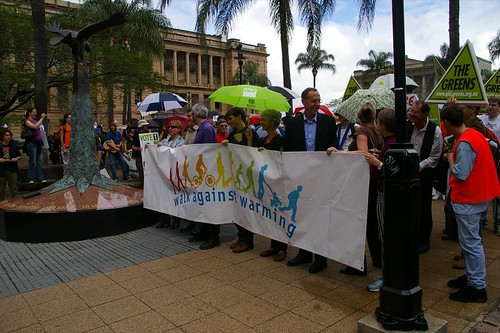By Tim Flannery
January 2, 2007
Article from The Australian Age.
The severity of the drought is reflected in the economic figures, and so dire is the shortfall of production that soon all Australians will be paying more for their food.
It's not just the lack of rain that's the problem, but the lack of flow in our rivers. The great irrigation areas of the Murray-Darling basin that feed most of our nation, and provide most of our exports, are suffering disproportionately.
And if things continue this way much longer, it's not water for crops that will be insufficient, but water for towns.
Think of the worst drought Australia has faced since record-keeping began, then take away three-quarters of the trickle that flowed in the Murray-Darling back then. That's how much water is flowing through Australia's arterial rivers this year.
Thus, many argue, this drought is four times worse than any experienced in the past 200 years and so it is increasingly referred to as the one-in-1000-years drought. But is it really a drought, or the new climate? Much hinges on this distinction.
The climate of south-eastern Australia changed dramatically in prehistory. In the Mallee, in Victoria's north-west, you can still see the sand dunes - stabilised now - testifying to the fact that this vast region used to be a Sahara of shifting sands. Ten thousand years ago the climate changed, allowing the mallee trees to grow. This tells us that the possibility of a climate shift is real enough.
But let's look at evidence that can tell us whether the one-in-1000-years drought is caused by industrial pollution or natural climate variability.
This year, Australian climatologist Neville Nichols and his colleagues solved one of the great mysteries of climatology - one that bears directly on the nature of Australia's big dry.
Read rest of the article.
Thursday, January 04, 2007
Whither our weather?
Posted by
National Enquirer
at
7:16 am
![]()
Labels: australia, climate change, drought, global warming, tim flannery
Subscribe to:
Post Comments (Atom)





No comments:
Post a Comment